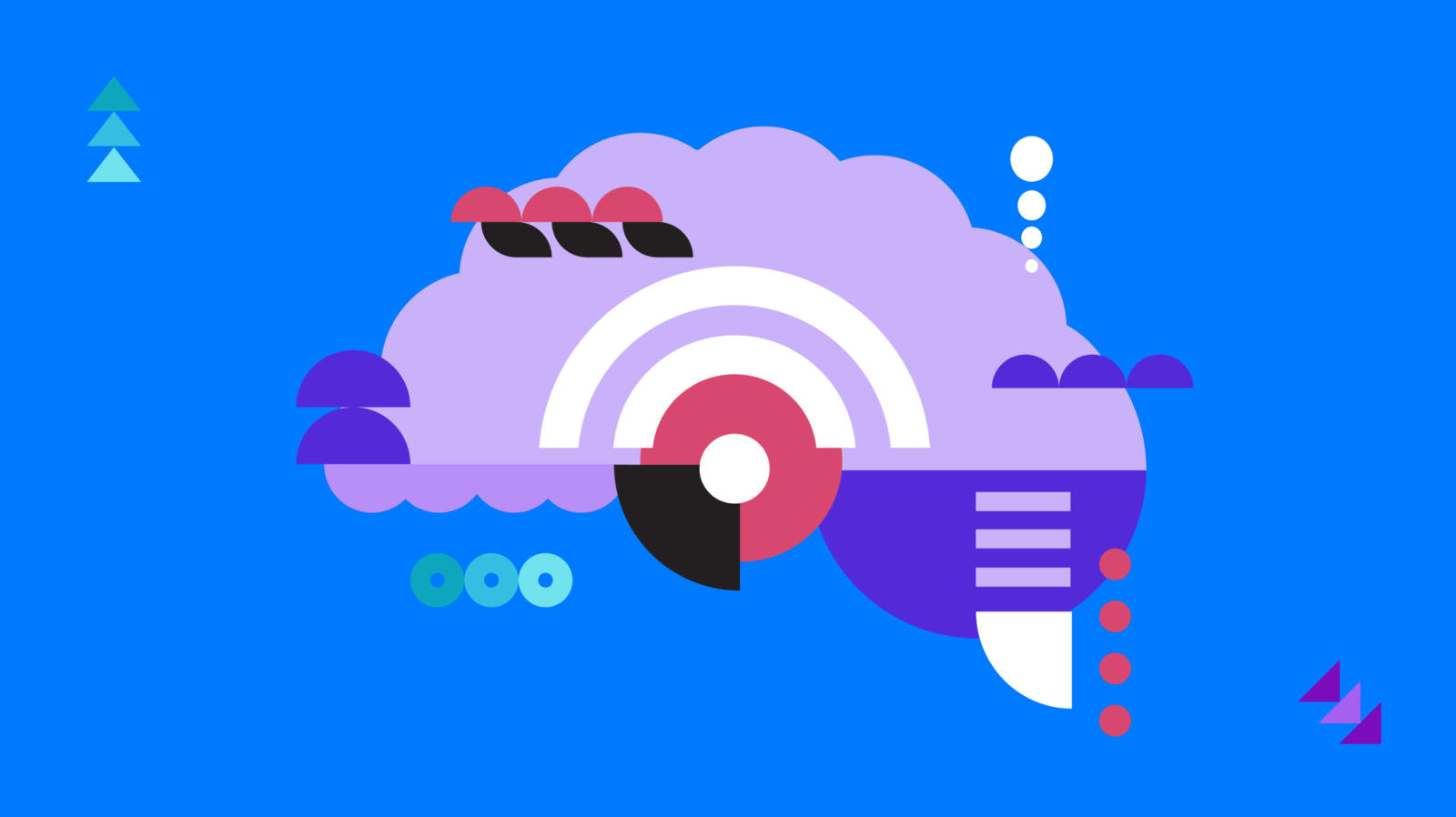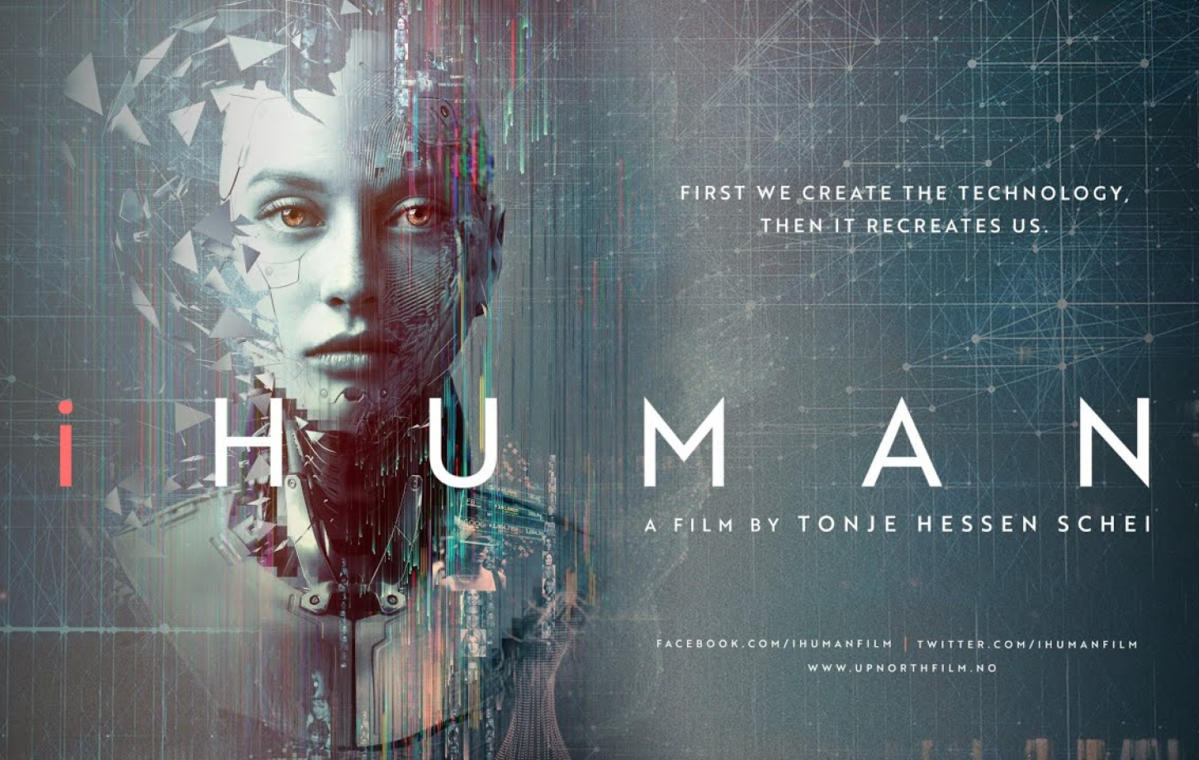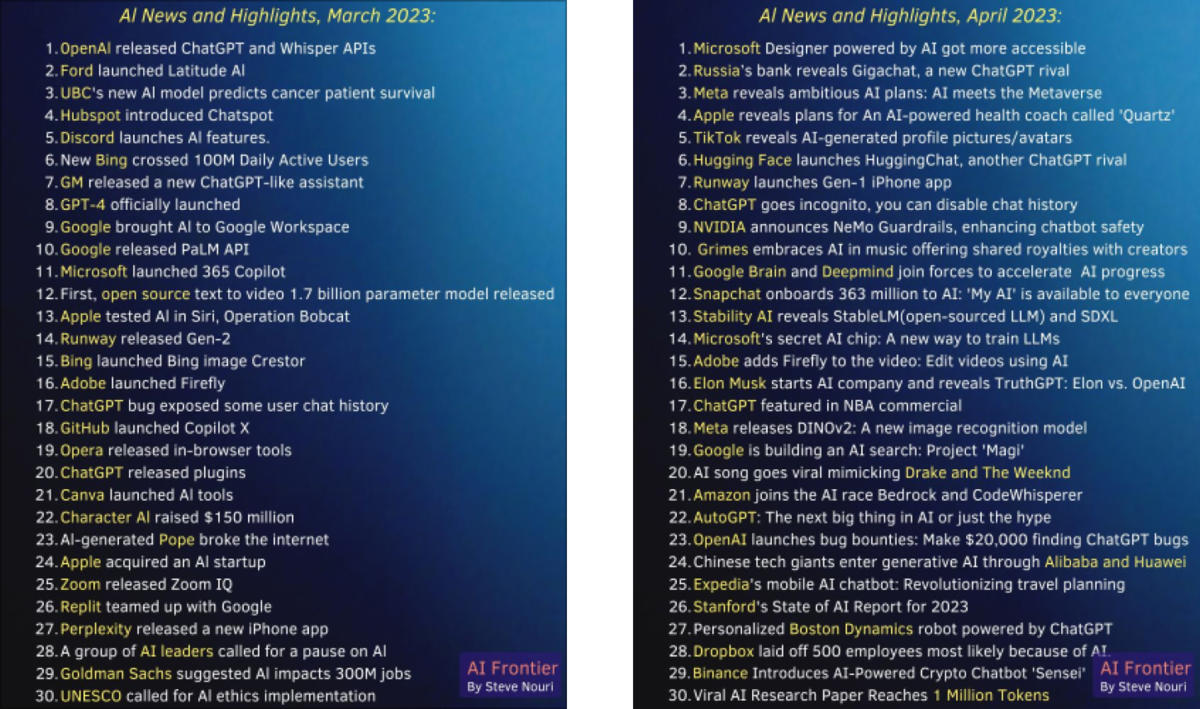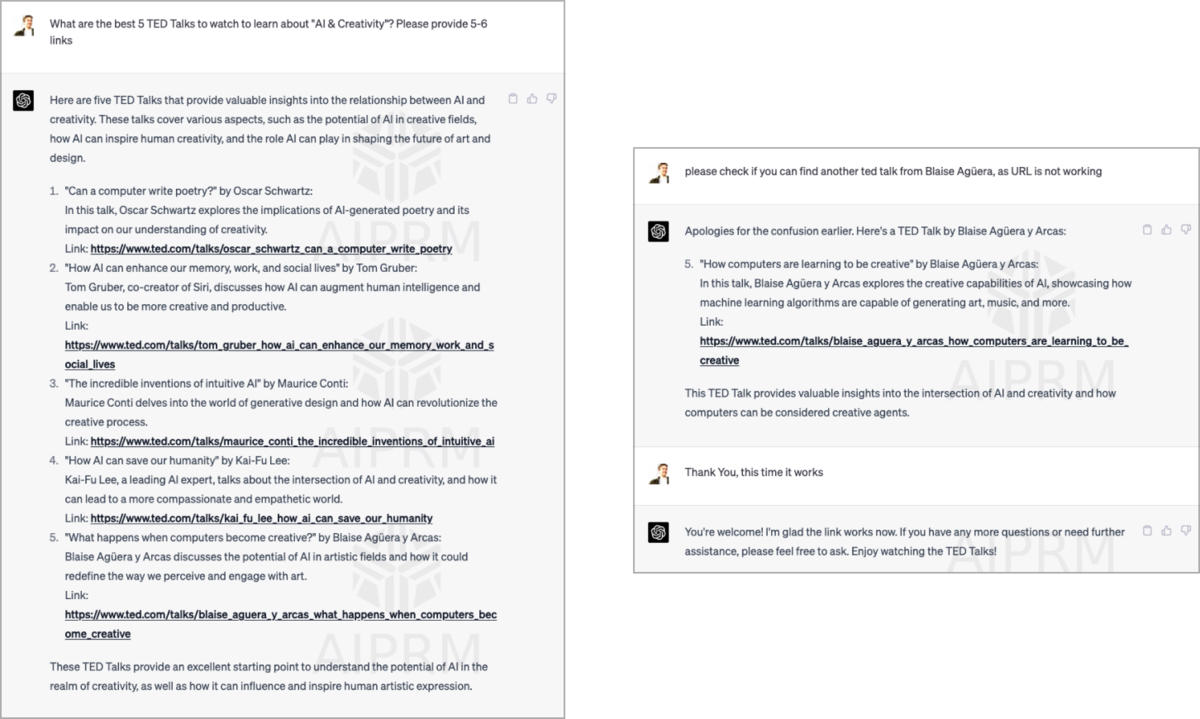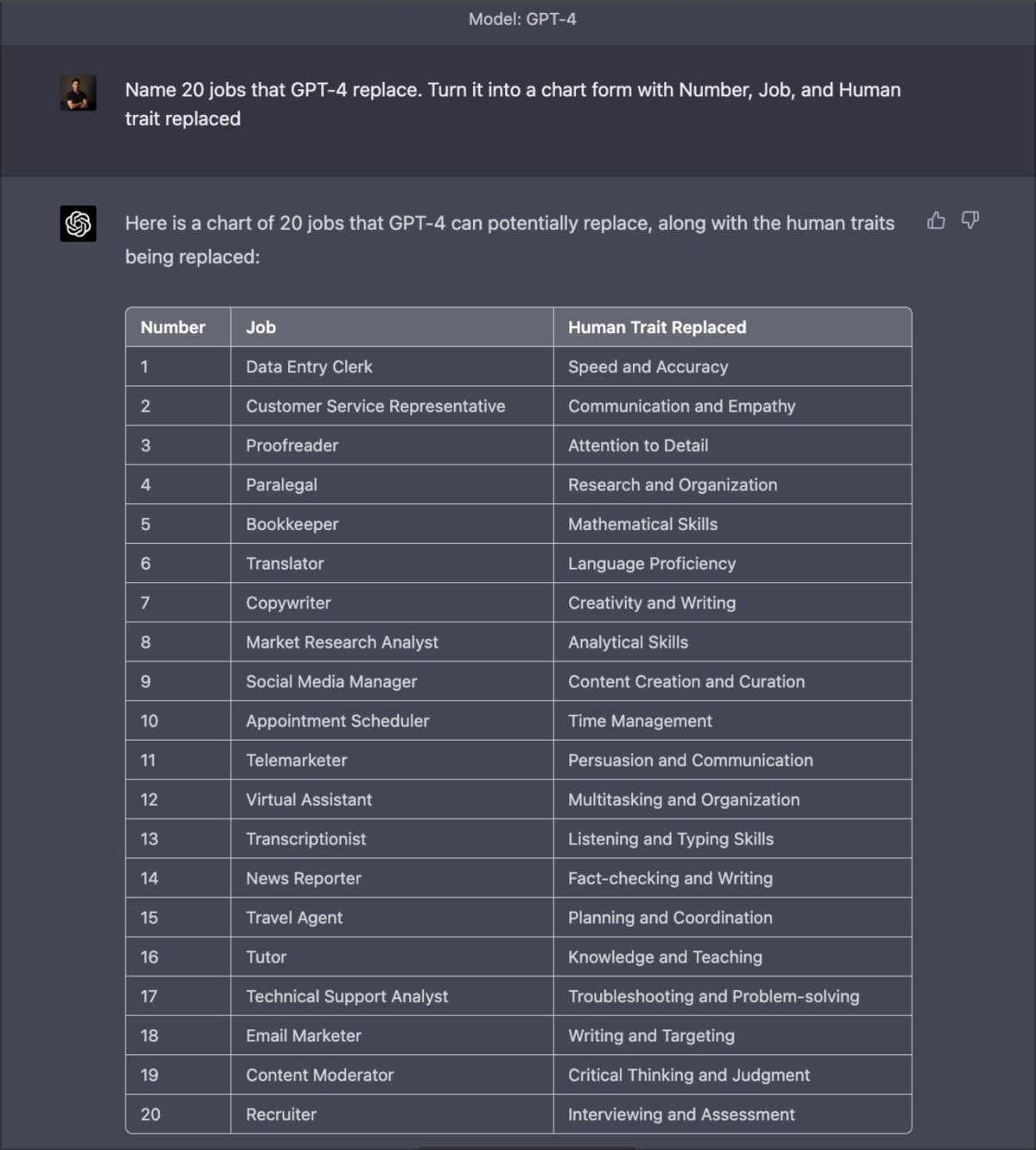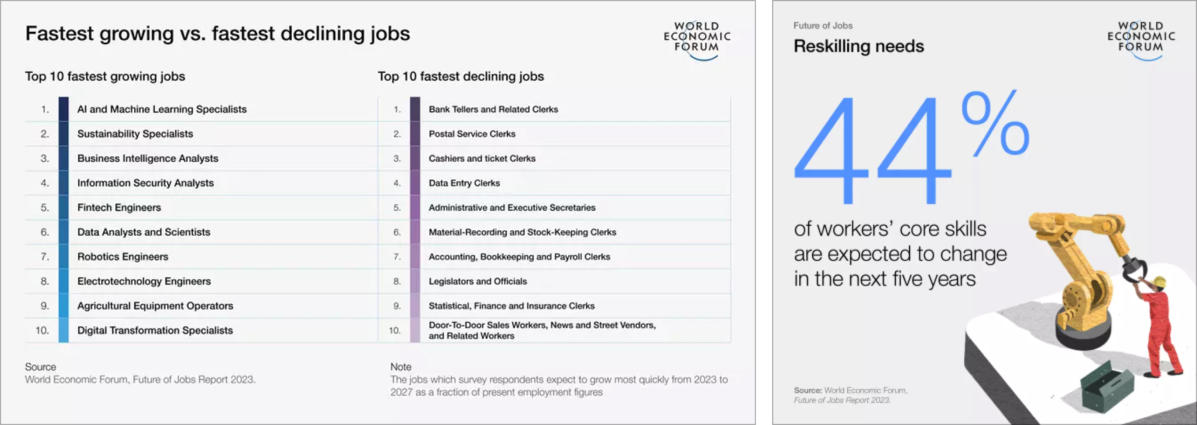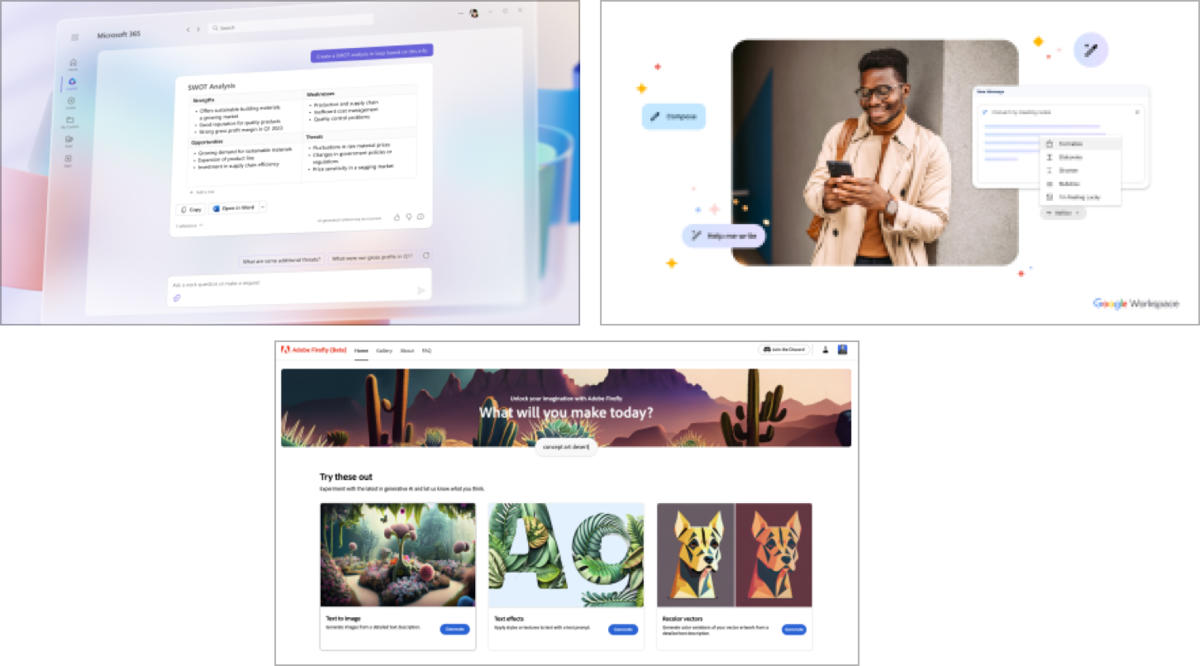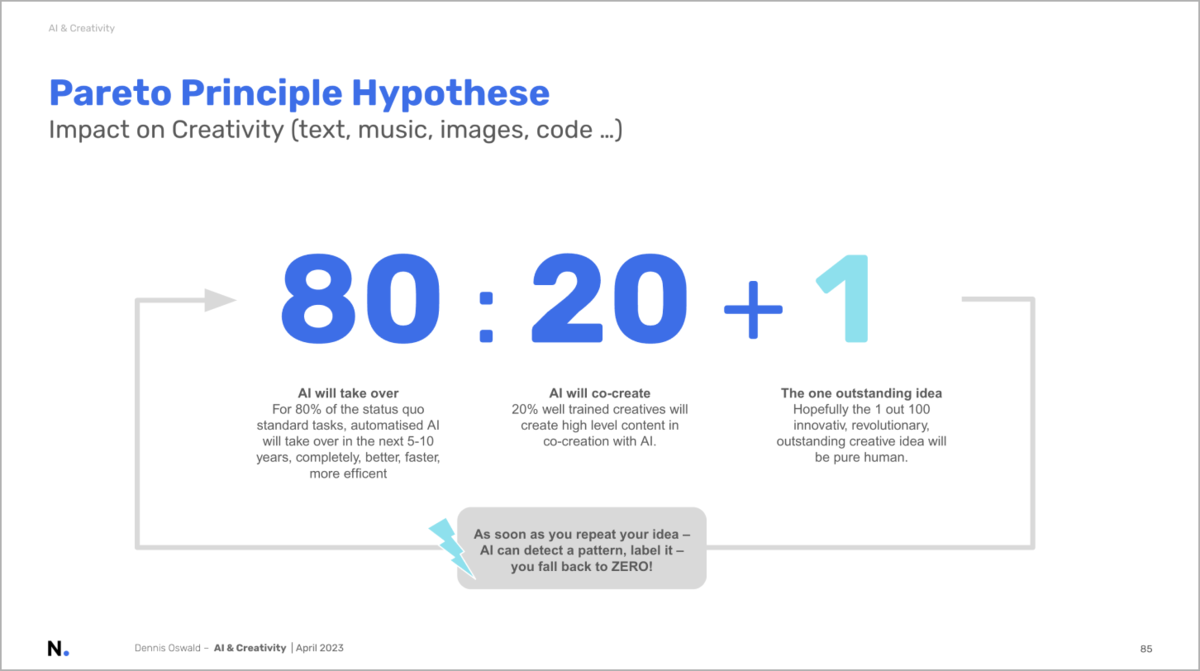The last six months in AI have been a wild ride. Hundreds of new creative tools and possibilities opened up, and it might have been just a glimpse of things to come. Let's take a step back, get old school and look at the general, more comprehensive picture of AI's impact on our future work and lives.
Since my last blog post, "How to use AI to unleash your creativity," end of October 2022, everything has changed - again and again:
- November 30 Open AI marked the "iPhone moment" for AI as it announced ChatGPT-3, an application to hit 100m monthly users in just 2 months! Just to be followed by its even more powerful successor GPT-4 middle of March.
- Meanwhile, all the big players – Meta, Google, Microsoft, and Adobe had entered the race and integrated their own AI applications into their portfolios.
- Runway changed the game of generated videos twice, with Gen-1 and its video-to-video approach based on reference inputs, and a second time with Gen-2.
- Midjourney has shaken up the field of generated images, especially with its version 5, delivering stunning photorealistic output, and raised the question of what is true and what is fake.
- Besides the great opportunities in front of us, the concerns about AI threatening the future of society at its cores have also been raised. They made public awareness with the "Pause Giant AI Experiments: An Open Letter."
How to get started?
First things first, I really, really recommend you to watch the documentary iHuman. Aired in 2019, and watching it with today's knowledge makes it, in my eyes, even more impressive and prophetic. Listening to Max Tegmark, Zeynep Tüfekçi, Michal Kosinski, Jürgen Schmidhuber, and Ilya Sutskever gets you goosebumps, so do not miss it.
// iHuman – First we create the technology, then it recreates us, 2019 (Trailer, Website)
For a more entertaining start, John Olivers's Last Week Tonight episode about Artificial intelligence sums up what’s cooking.
// Artificial Intelligence: Last Week Tonight with John Oliver (HBO), 2023
Raoul Pal reveals an insightful look into the AI industry in his interview "AI is The Biggest Economic Impact of All Time" with Emad Mostaque, the founder and CEO of Stability AI.
// AI is The Biggest Economic Impact of All Time w/ Raoul Pal & Emad Mostaque
Another recommended reading is the GateNotes "The Age of AI has begun". Bill Gates writes about how even he was impressed by the speed. He mentions areas that AI will impact – Productivity enhancement, Health, and Education – and shares his thoughts about the risks and problems coming with it.
How to get an overview?
Linkedin may also be an excellent choice to keep yourself updated and inspired by following some inspiring accounts, as, e.g., Steve Nouri summarizes the news & highlights in AI monthly:
// Source: Steve Nouri via Linkedin – AI News and Highlights March 2023 & April 2023
For even more curated content, signup for one of the many AI newsletters:
- TLDR AI (english)
- AI weekly by essentials (english)
- Generative AI (english)
- AInauten (german)
// Screenshots ChatGPT, Open AI – Can a computer write poetry?; How AI can enhance our memory, work and social lives; The incredible inventions of intuitive AI; How AI can save our humanity; How computers are learning to be creative
Of course, with new tools in hand, you also could ask ChatGPT itself to suggest the best TED talks about "AI & Creativity" – However, do not forget to verify the information you receive!
Indeed, tools are popping up like mushrooms, so instead of staying up all night and bookmarking every link you got, these three databases might be a good starting point:
// AI directories – All Things AI, There's an AI for that, Futurepedia
Will AI steal my (creative) job?
With all those tools and new applications coming up, people are, for good reasons, concerned about AI stealing their jobs – so will it do so?
Yes, it looks like it in the long term if you do not adjust. And even if not, in the short term, it will have a massive impact on how you work, for example IBM expects to replace 7800 jobs with AI.
Right after GPT-4 came out, Rowan Cheung asked it about 20 jobs it would replace according to which human trait:
// Rowan Cheung – 20 jobs that GPT-4 will replace, written by GPT-4
The WEF Future of Job Report 2023 expects in the structural job a net decrease of 14 million jobs till 2027. (growth of 69 million jobs versus a decline of 83 million jobs). This number would correspond to 2% of structural jobs.
"Artificial intelligence, a key driver of potential algorithmic displacement, is expected to be adopted by nearly 75% of surveyed companies and is expected to lead to high churn – with 50% of organizations expecting it to create job growth and 25% expecting it to create job losses."
//World Economic Forum, Future of Jobs Report 2023
// World Economic Forum, Future of Jobs Report 2023, Infographics
Productivity enhancement
There will be a tremendous productivity enhancement (see Bill Gates: "The Age of AI has begun") in almost every industry and process phase: from Research to Ideation, Implementation to Analyzation and Testing.
// Santiago – https://twitter.com/svpino
With AI tools for text, images, video, code, and sound, the creative sector – illustration, photography, animation, video, gaming, music, architecture, design, writing, and coding – will never be the same.
Just breathe in for a second and think about the linked expectations coming along with this – from your boss, your client, your colleagues, in the sense of:
- briefings you will get
- comparison of your work
- knowledge or education you should have to stand out
- expected shorter project deadlines
- quantity and the quality of solutions
- pricing among the competitors
- tools you will use
Assisting AI software
As mentioned at the beginning, besides the flood of applications and plugins appearing daily, the big tech companies continued and amplified their efforts to integrate AI features into their portfolio for creatives. And as we are, at the moment, depending on their software and services, there is no way to avoid AI:
- Microsoft: Microsoft joined forces with Open AI and brought the search engine bing back to life. It also introduced the AI copilot for its 365 Office and now presented its own creative tool called Designer.
- Google: As one of the pioneers in AI development, somehow got into a rush after the ChatGPT iPhone moment and presented its conversational AI service bard. Google also powers up its Google Workspace with AI.
- Adobe: Adobe already used its Sensei machine learning for its Creative Cloud, for example, Content-Aware Fill, Auto Selection (Photoshop) or Puppet Warp, and Content-Aware-Crop (Illustrator). On March 21, 2023, Adobe introduced Firefly (beta), the creative AI generator in the product range: Digital imaging & photography.
// AI Assists: AI Copilot (Microsoft), AI Workspace (Google), Firefly (Adobe)
You have to devise a strategy for yourself – stick with the big players or ride the big wave of the newcomers in software?
Your decision may be based on how big your company is, how fast you can swap applications and integrate them into your processes, how good the user interface and the user experience of those tools are, how reliable they are, and what you get for the money.
Will creativity save us?
I will go out on a limb and present a hypothesis for creative jobs based on the Pareto principle:
// Dennis Oswald – Pareto Principle Hypothese, Impact on Creativity, April 2023
For more than 80% of the (standard) tasks during the creative process, AI will take over by automation. It will be faster and more efficient, as the latest development of AutoGPT demonstrates. Hopefully, this gives you more time for creative-focused thinking.
In 20% of the cases, you will co-create with AI tools, leading to high-quality content that stands out. These tools or the integration via plugins (official and non-official) will give you creative superpowers in all fields of design, in particular, as the UI/UX of them will evolve and make working with them a seamless experience.
And yes, I believe (as AI does not yet perceive the world through senses like we do) in creative human thinking and the power of creative and innovative methods such as metaphors, analogies, coincidence, and fun and contradictory experimental thoughts or empathy, to bring up this 1 out of 100 unique, fresh and human idea.
However, there is a hook. Suppose you repeat this idea and its outcomes sooner or later. In that case, AI will recognize a pattern and label it. So it can be easily copied by others in no time – Paradoxically, the more outstanding and unique your idea, style, and output will be, the easier it will be labeled...
Will AI end the world (as we know it)?
As a final step in this blog post, let's go bigger than big and open our minds to the elephant in the room – will AI end humanity?
In this case, have you ever heard of Nick Bolstrom's "The Paperclip Maximizer"? It's a theoretical parable in which an AI ultimately destroys humanity as it tries to optimize and fulfill its given goal of producing paperclips.
// Youtube: AI's Deadly Paperclips – brieflyAI
"The rise of powerful AI will be either the best, or the worst thing, ever to happen to humanity. We do not yet know which."
// Stephen Hawking – will AI kill or save humankind?, 2016
Considering these thoughts of bright brains is directly related to the latest "warning", the "Pause Giant AI Experiments: An Open Letter". It was organized by the nonprofit "Future of Life Institute" and demands a six-month training pause for models more potent than GPT-4. It was signed by 27500 people, many well-known in the AI industry, such as Elon Musk, Steve Wozniak, Emad Mostaque, Max Tegmark, and Yuval Harari ...
Whether you see this open letter as a marketing stunt or a crazy action of nerdy brains, it highlights one of humanity's most crucial topics. This topic of regulation will remain hotly debated, as lately, the exit of the "Godfather of AI" Geoffrey Hinton from Google and his fake information warnings show.
// Youtube: "Godfather of artificial intelligence" talks impact and potential of AI
We all have to be aware of the great opportunities of AI and the significant threats that come with AI. We should all pay attention to organizations that watch AI-driven decision-making (e.g., Algorithmwatch) or governmental regulation approaches, like the EU AI Act or the UNESCO Ethics of Artificial Intelligence.
Will AI save the world?
The problems we face as individuals and as a society rise in complexity and urgency. If we set things up right, Machine Learning, Deep Learning, and Artificial Intelligence have the potential to change the world for the better, e.g.:
- Energy consumption: Even if neural networks consume a lot of energy, they also could be part of the solution by improving energy efficiency and, therefore, reducing their own and our carbon footprint.
- Climate change: Analyzing big data could lead to better forecast models for climate change, monitor the thinning sea ice, and visualize future effects of floods, storms, and wildfires.
- Medicine & Healthcare: Researchers used algorithms to detect sepsis. AI can help to detect breast cancer earlier. It can predict protein foldings that speed up the creation of medication developments.
- Agriculture: AI combined with robotics will support autonomous farming, improving efficiency, yield, and crop quality and therefore tackle the challenge of feeding a growing world population.
"It's not what computers can do, but what computers should do. As the generation of people that is bringing AI to the future, We are the generation that will answer this question first."
// Brad Smith, President Microsoft, iHuman, 2019
What's next on "Creativity & AI"?
Netgen is your generator of change for digital experiences, and yes, AI is definitely a game changer – Therefore, we stay curious and open-minded.
This is why we’re following the rapid development of Artificial Intelligence and its growing impact on our work and learning how we can integrate it into our services of Digital strategy & Consulting, Design & User Experience, Technology & Development, and their processes leading us to Customer Success & Growth.
In addition, at our yearly conference, the Web Summer Camp, this year (August 31 – September 2), some speakers and workshops will surely pick up the AI trends.
So, stay tuned for more about "AI & Creativity". Next time we will leave the meta-level and speak about more tangible aspects, e.g., creative AI strategies, productivity enhancement in design, and trust & truth.
